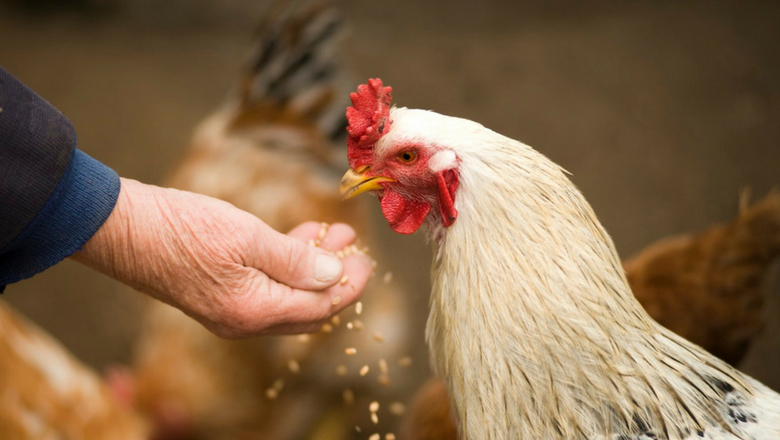Provided by Pathways to Family Wellness magazine, published by ICPA | Written by Jeanne Ohm D.C. Pathways Issue #27
I believe in informed choice. Here is the lowdown on the various terms being used to describe chicken raising: organic, vegetarian-fed, cage-free, free-range and pastured. It is important to define these terms, as their very names mislead and confuse.
Organic: “Not everything it’s cracked up to be.”
This label merely states that the chicken’s food sources are free of harmful chemicals. It does not clarify how the chickens were raised, or if they had access to a pasture or not. Trendy, but not relevant.
Vegetarian-Fed: “Dumb cluck.”
Since most people think grains should comprise the majority of the chicken’s diet, a vegetarian-fed chicken seems appealing. The truth of the matter is that chickens need protein from grubs and bugs, as well as fresh greens and seeds. “Vegetarian-fed” is
another designer term, and guarantees that the chickens do not have access to the pasture, where it would be virtually impossible to keep them from eating grubs.
Cage-Free: “Ruffle your feathers.”
I was a bit annoyed when I found out the real meaning of this marketing label. It insinuates that the chickens are free to roam, and are not confined to the dismal living conditions of a cage. In reality, the chickens may not be caged, but are usually confined to dark barns they can never leave. At best, they have access to fenced bare dirt or cement yards stripped of all plants and potential nourishment. That yard access, however, is usually designated by the term “free-range.”
Free-Range: “Caught with egg on your face.”
Again, the implication is that these chickens are roaming a lush, green pasture with unlimited access to grasses, grubs and sunlight. The term has become abused, because many commercial poultry farms can simply place a small door in a huge barn with access to the outdoors.
Access, however does not guarantee that the chicken will make it outside. And “outdoors” in these setups could mean a dirt or concrete patch. The legal qualifications to use this term are that chickens need only a small patch of dirt to be on instead of being caged.
No pastured diet is considered in this legal definition. The term “free-range” is often
confused by the public as meaning pastured.
Pastured: “Something to crow about.”
There are three types of pastured poultry. Some are kept in movable, floorless “tractors” with continued access to grass. Ideally, the tractors are moved daily to give the chickens access to new grass for eating and cleaner areas, free of daily droppings. Another system provides free access to large areas of pasture, secured by movable electric fences to keep foxes out (foxes can deplete a flock rapidly). The third option, fenceless pastured, is the freest lifestyle for the chicken—and often the most traumatic for the farmer. I have chased many a fox and flailed my arms at numerous hawks. The term “pastured poultry” makes people think of pasteurization. A more user-friendly term would be “grass-fed,” but
the term “free-range,” which implies chickens happily grazing in the pasture, seems to have better market appeal. Unfortunately, as you have just read, “free range” is really not so free. Pastured poultry comes from small farms that sell their wares at local markets. Supermarkets, and even most health food stores, do not carry pastured eggs. Pastured eggs can also come from your own backyard. Many families are now raising hens in their yards, enjoying their many benefits.
How nutritious are eggs? Eggs are an easy and inexpensive source of protein with at least 9 amino acids. In general, eggs contain almost all vitamins (except for C) with high levels of all B vitamins, and a good source of folate, A, D and E. Eggs provide a high source of the nutrient choline, which is important in the regulation of the nervous system, brain and cardiovascular system. Eggs are also a rich source of many essential minerals. Eggs from pastured hens have been shown to offer even greater nutritional value. In 2007, Mother Earth News conducted an egg testing project to establish just this. Their testing found that, compared to official U.S. Department of Agriculture (USDA) nutrient data for commercial eggs, eggs from hens raised on pasture may contain:
- 2/3 more vitamin A
- 3 times more omega-3 fatty acids
- 3 times more vitamin E
- 7 times more beta-carotene
http://icpa4kids.com/fwf/2016%20Newsletters/Wellbeing_December2016.pdf

